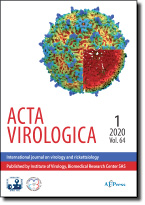Journal info
|
||
Select Journal
Journals
Bratislava Medical Journal Endocrine Regulations General Physiology and Biophysics Neoplasma Acta Virologica Current articles 2023 2022 2021 2020 2019 2018 2017 2016 2015 2014 2013 2012 2011 2010 2009 2008 2007 2006 2005 2004 2003 Studia Psychologica Cardiology Letters Psychológia a patopsych. dieťaťa Kovove Materialy-Metallic Materials Slovenská hudbaWebshop Cart
Acta Virologica Vol.52, No.4, p.251-256, 2008 |
||
| Title: Molecular characterization and sequence variability of betasatellites associated with leaf curl disease of kenaf (Hibiscus cannabinus L.) from different geographical locations of India | ||
| Author: S. Paul, A. Roy, R. Ghosh, S. Das, S. Chaudhuri, S. K. Ghosh | ||
| Abstract: Leaf curl disease of kenaf (Hibiscus cannabinus L.) in India has been found to be associated with begomoviruses and betasatellites. Here, we report the molecular characterization and phylogenetic relationship of the nine isolates of betasatellites obtained from three geographical locations in India. The betasatellites coming from northern and eastern region of India shared 84.3% nucleotide sequence identity and formed two sub-clusters within the main cluster containing different isolates of Cotton leaf curl Multan betasatellite (CLCuMB) isolated in Indian subcontinent. Betasatellites coming from the southern part of India were identified as the isolates of Tomato leaf curl Joydebpur betasatellite and shared 45.2 and 44.9% sequences identity with their counterparts coming from the eastern and northern India, respectively. The present study represents the first report about the association of the leaf curl disease of kenaf with the betasatellites infecting both malvaceous and non-malvaceous crops in India. |
||
| Keywords: Begomovirus; betasatellite; kenaf; leaf curl disease; phylogenetic relationship | ||
| Year: 2008, Volume: 52, Issue: 4 | Page From: 251, Page To: 256 | |
|
Price:
14.40 €
|
||
|
|
||

